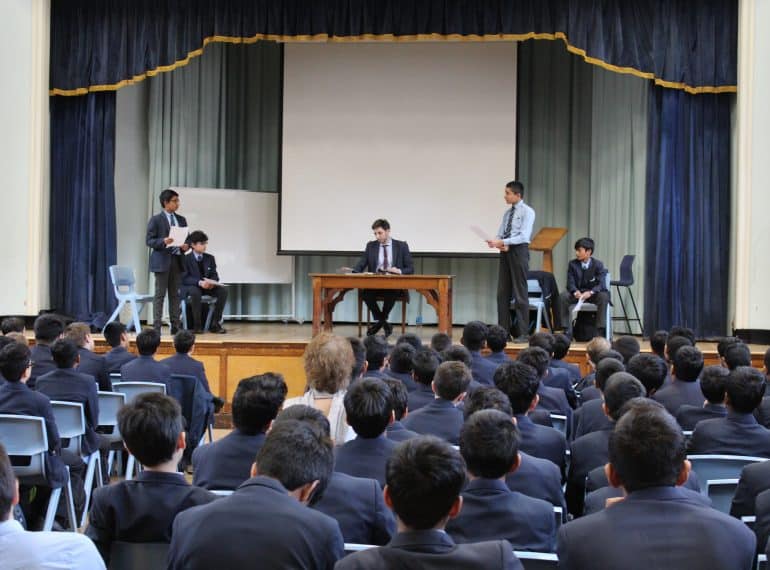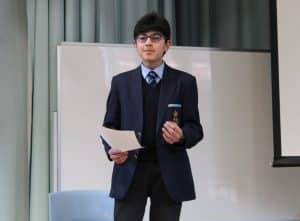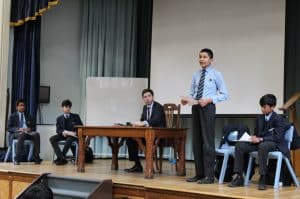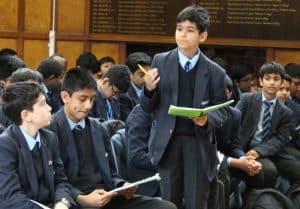Debating the pros and cons of censorship – the noes have it!

The Year 8 Inter-House Debating Final was won by the finest of margins, following an evenly matched contest between Stapylton and Leicester.
After fluent and compelling debate from both sides, the Leicester team, opposing the motion, This house believes that censorship has no place in a democracy, prevailed by just a single point.
Head of English Robert Hyland, who organised the event, said: “At QE, we are fully persuaded of the importance of nurturing effective oracy and skills in public speaking and debating among our pupils. All the boys who took part in this final are therefore to be congratulated, as they presented an excellent, well-argued debate in the best QE tradition of closely competed inter-house competitions.”
 Zaki Mustafa, the first main speaker for Stapylton, presented the proposition in his allocated five minutes. He argued that freedom of speech is a pillar of democracy and a key human right, adding: “Democracy means that we decide how our country is run – the government is there to implement our decisions, not to make them.”
Zaki Mustafa, the first main speaker for Stapylton, presented the proposition in his allocated five minutes. He argued that freedom of speech is a pillar of democracy and a key human right, adding: “Democracy means that we decide how our country is run – the government is there to implement our decisions, not to make them.”
He also referenced the Watergate scandal, suggesting that the suppression of information resulted in “disastrous consequences” leading to US President Nixon’s resignation. He also pointed out that in Turkey, censorship has led to the arrest of journalists which, in turn, has affected information flow to the public.
Ady Tiwari, who recorded the highest individual score on the day, presented a robust argument for the opposition in his five minutes: “Not all speech is equal,” he said. “Censorship reduces the impact of hate speech. Hate speech historically has led to oppression such as slavery and the denial of the vote to women.” He pointed out that live broadcasts by groups such as the Ku Klux Klan are illegal – clearly a case where censorship “stops hate and promotes equality and justice”, he said.
He also suggested that, for reasons of national security, government information needs to be kept secret. He argued that removing censorship would help terrorists and other criminals, such as identity thieves.
 Ady added that censorship is needed in many key areas of society, including the internet, television, film and the media, and that, without censorship, children could search online for information about pornography and buying drugs. Democracy necessarily “includes censorship and we should use it to make the world a better place”, Ady concluded.
Ady added that censorship is needed in many key areas of society, including the internet, television, film and the media, and that, without censorship, children could search online for information about pornography and buying drugs. Democracy necessarily “includes censorship and we should use it to make the world a better place”, Ady concluded.
Among the topics covered by Stapylton’s second main speaker, Koustuv Bhowmick, were parental controls: these were an effective way of controlling children’s internet use, yet they could be classified as restriction, rather than censorship. He also looked at the deleterious effects of censorship in regimes such as North Korea and China, arguing that, in the latter case, it was abuse of censorship that had led to the coronavirus scandal.
The opposition’s second main speaker, Adi Kaneshanatha, returned to the dangers of hate speech, stating that “hate crime causes violence” and warning that it increases the social stigma of the groups discriminated against, which, in turn, affects mental health. He looked at the issue of fake news, arguing that censorship will help stop it, and urged speakers to trust the Government’s judgement in ensuring that its citizens are not exposed to inappropriate material.
 Three speakers from each side raised points or questions from the floor. For Stapylton, Joel Swedensky, Harrshiv Vyas and Akshat Bajaj touched on the importance of educating people with negative or hateful views rather than just silencing them. Leicester’s floor speakers, opposing the motion, were Abhay Halyal, Nikhil Mark and Pranav Haller, who cited as an example of the serious dangers of an absence of censorship the fact that terrorists can learn to make bombs online.
Three speakers from each side raised points or questions from the floor. For Stapylton, Joel Swedensky, Harrshiv Vyas and Akshat Bajaj touched on the importance of educating people with negative or hateful views rather than just silencing them. Leicester’s floor speakers, opposing the motion, were Abhay Halyal, Nikhil Mark and Pranav Haller, who cited as an example of the serious dangers of an absence of censorship the fact that terrorists can learn to make bombs online.
The event was adjudicated by Dharrshan Viramuthu, of Year 12, who is a member of QE’s Cambridge Union Schools Debating Competition team. He congratulated all the speakers and also dispensed some advice, suggesting inter alia that they try to minimise reliance on scripts.
He awarded opponents Leicester 59 points out of a possible 70, thus just pipping proposers Stapylton, who picked up 58 points. An indicative vote from the floor was fairly evenly split, but again just favoured the opposition.
